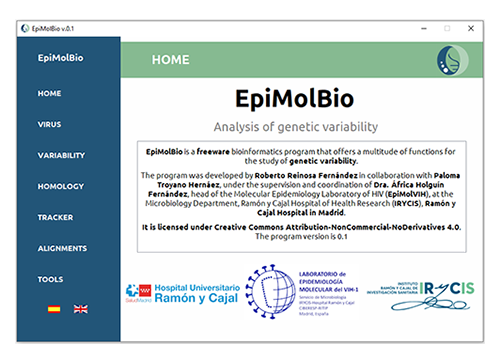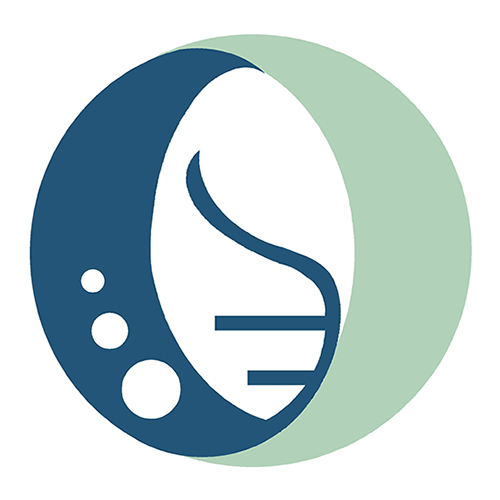BIOINFORMATICS AND GENETIC VARIABILITY

EpiMolBio Program
EpiMolBio is a software created in our laboratory, designed to explore genetic variability. It is free to use and features an intuitive and user-friendly interface.
Its extensive set of tools includes sequence processing, conservation and variability analysis, consensus sequence generation, and identification of mutations or amino acid changes, including specialized tools for HIV and SARS-CoV-2 analysis.
Genetic analysis plays a crucial role in modern medicine. However, many bioinformatics tools are costly or complex, which reduces their user base and limits global collaboration in research.

EpiMolBio interface
Our goal was to develop a versatile and simple program that adapts to the user's objectives.
EpiMolBio was developed in 2018 for studies on variability and drug resistance in HIV. At the onset of the COVID-19 pandemic, new features were developed for mutation tracking and variant analysis, along with additional software for bulk alignments, file editing, and sequence processing. The software supports sequences in the widely used .fasta format, along with user-defined reference sequences, facilitating the study of pathogenic microorganisms or other medically and biologically relevant entities.
EpiMolBio Functions
EpiMolBio has 6 main functions with several tools each:
- Virus: Specific tools for HIV resistance mutation and conservation analysis, and SARS-CoV-2 protein tracking
- Variability: Identify polymorphisms, determine conservation or mutation frequency, derive consensuses, and calculate Wu-Kabat coefficient.
- Homology: Search for, compare, and extract target sequences based on established similarity criteria.
- Tracker: Search for proteins and target sequences within a set of longer sequences.
- Alignments: Perform alignments, delete insertions and create dot-plot graphics.
- Tools: Edit files. Filter, count or translate sequences. Automate EpiMolBio’s functions.
Access the program
Access the website epimolbio.com where you can start using the EpiMolBio program for free. The website is available in English and Spanish and contains more details about the program and its use, as well as user manuals and video tutorials.

EpiMolBio in research
Evolution of SARS-CoV-2 in Spain during the First Two Years of the Pandemic: Circulating Variants, Amino Acid Conservation, and Genetic Variability in Structural, Non-Structural, and Accessory Proteins. Troyano-Hernáez P, Reinosa R, Holguín Á. International Journal of Molecular Sciences (2022) doi: 10.3390/ijms23126394. HIV Capsid Protein Genetic Diversity Across HIV-1 Variants and Impact on New Capsid-Inhibitor Lenacapavir.Troyano-Hernáez P, Reinosa R, Holguín Á. Frontiers in Microbiology (2022)doi: 10.3389/fmicb.2022.854974. Genetic Diversity and Low Therapeutic Impact of Variant-Specific Markers in HIV-1 Pol Proteins.Troyano-Hernáez P, Reinosa R, Holguín Á. Frontiers in Microbiology (2022)doi: 10.3389/fmicb.2022.866705. HIV Transmembrane Glycoprotein Conserved Domains and Genetic Markers Across HIV-1 and HIV-2 Variants.Valadés-Alcaraz A, Reinosa R, Holguín Á. Frontiers in Microbiology (2022)doi: 10.3389/fmicb.2022.855232. Evolution of SARS-CoV-2 Envelope, Membrane, Nucleocapsid, and Spike Structural Proteins from the Beginning of the Pandemic to September 2020: A Global and Regional Approach by Epidemiological Week.Troyano-Hernáez P, Reinosa R, Holguín Á. Viruses (2021)doi: 10.3390/v13020243. Short Communication: Update in Natural Antiretroviral Resistance-Associated Mutations Among HIV Type 2 Variants and Discrepancies Across HIV Type 2 Resistance Interpretation Tools.Troyano-Hernáez P, Reinosa R, Burgos MC, Holguín Á. AIDS Res Hum Retroviruses (2021)doi: 10.1089/AID.2020.0180.
You can also contribute your grain of sand to continue advancing in the creation of bioinformatics tools for the analysis of genetic sequences of biomedical interest.
Do you want to collaborate?
Join our Teaming group for just one euro per month or donate whatever you consider as an individual or company.
Together for progress in genetic research!



